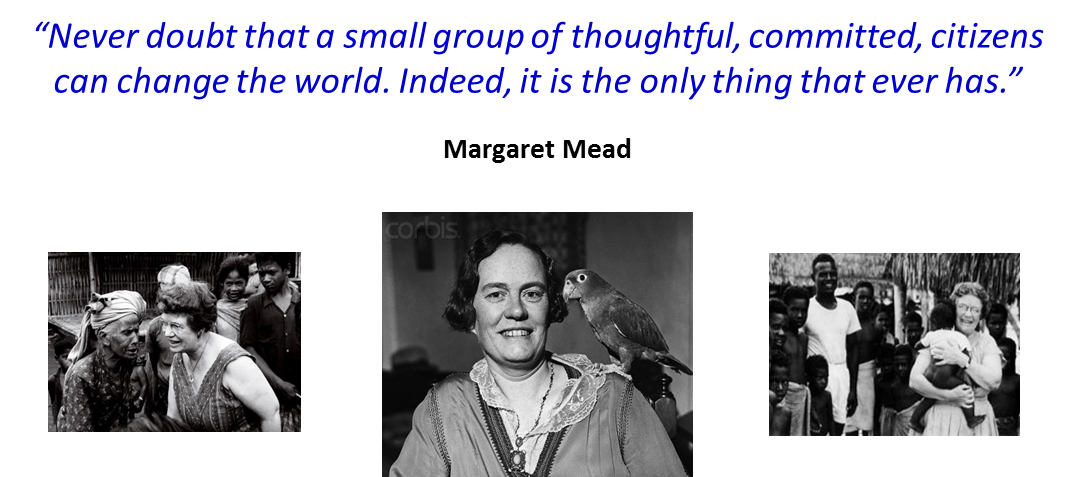|
|
by Rick Baker
On Mar 28, 2013
Thought Tweet #704 Good Leaders centre their attention and focus on the place where Talents meet Tasks.
The Thinking Behind The Tweet
Good leaders recognize you cannot force round individuals into square roles and you cannot force square individuals into round roles.
Good leaders know you must take Talent to Task. More specifically, good leaders recognize you cannot force round Talents into square Tasks and you cannot force square Talents into round Tasks.
To Take Talent To Task you must know the details of both the individual's talent and the task and you must know how they fit one another...the better the fit, the better the work, the more the value, the more the profit.
by Rick Baker
On Mar 26, 2013
Here is a list of things that throttle ideas, nipping ideas in the bud or nipping them soon after...
1. Lack of Self-confidence
2. Lack of Self-knowledge around Talents & Strengths
3. Lack of Education, specifically in the areas of Creativity: 'Lateral Thinking', Ideation, Intellection, Invention, & Innovation
4. Narrow & Different Perspectives
5. Lack of Process for Idea-generation [Curiosity, Creativity, Invention, & Innovation]
6. Lack of Practise [at what we call ‘IDEA-storming’]
7. Bad Habits: blaming others rather than accepting responsibility
8. The mistaken belief that ‘Process kills Creativity’
9. Confusion around Routine versus not-Routine work
If you see your people or your business stagnating in old ideas...don't worry about it or complain about it - check for these 9 things and take action to remove them.
Some related articles...
About Courage & Confidence https://rickbaker.ca/search.aspx?q=self-confidence
About Talents, & Strengths https://rickbaker.ca/post/2013/02/19/Talents-Strengths-another-perspective.aspx
About Ideation & Intellection https://rickbaker.ca/post/2012/12/18/So-you-think-you-have-INSIGHT.aspx
About Narrow & Different Perspectives https://rickbaker.ca/post/2013/02/05/NewBinocularsHelpYouSeeEyetoEye.aspx
About Process for Idea-Generation https://rickbaker.ca/post/2011/11/23/In-the-Clutch-of-Ideas.aspx
About Practise https://rickbaker.ca/post/2012/11/16/A-Formula-for-Personal-Strengths.aspx
About Bad Habits https://rickbaker.ca/post/2010/01/19/CHANGING-FOR-THE-BETTER-Good-Habits-Bad-Habits-New-Things.aspx
About the Belief ‘Process kills Creativity’ https://rickbaker.ca/post/2012/02/15/PROCESS-does-that-word-rub-you-the-wrong-way.aspx
About ‘not-Routine Work’ https://rickbaker.ca/post/2013/02/02/Separating-Routine-not-Routine-Work-Tasks.aspx
The bottom line...

Don't Give Ideas the Brake, Give Ideas a Break
by Rick Baker
On Mar 25, 2013
Thought Tweet #701 What makes you think you can mask that square talent in round task?

The Thinking Behind The Tweet
- Dan Pink says little rhymes are a good way to catch people's interest and influence them [I'm working on it]
- You cannot force a Square Talent into a Round Task
by Rick Baker
On Mar 21, 2013
Some time ago, I wrote,
"When it comes to filling roles at your company, rather than dwelling on who is right and who is wrong, business leaders should dwell on 2 things:
- Character Differences…particularly, the interplay between individual’s egos
- Individual’s Talents…particularly, the extent individual’s talents deliver value to the business" [for more thoughts in that area, see Getting The Right People on Your Bus]
A little later, I wrote,
"In a 2011 Canadian Corporate Culture study, 85% of respondents indicated that cultural fit is more important than necessary skills when hiring.
When you are hiring a person to join your business you must work to understand whether or not they will 'fit in' your business Culture.
That means at least 3 things:
- You must understand your business Culture and the details of its embedded Values and your rules [our Master Rules],
- You must understand the employee-candidate's personal Values, and
- You must determine whether or not the employee-candidate is compatible with our business Culture." [for more thoughts in that area, see Having Values, Delivering Value, & Recruiting Great People]
Why did I write those points?
I wrote them because I have witnessed many people recruiting at the 50% level. I mean, when they are recruiting they do half the work they need to do:
- they cover the tangible-technical aspects of the role, making sure credentials are in place, spending time figuring out the candidate's ability to perform the key of the role, etc. and Tasks
- they fail to cover the intangible aspects of the role such as culture fit, values fit, etc.
A month ago, I was involved in a very-interesting discussion about how to make sure leaders know how to apply the right people-talents to the right-work tasks. To sum up my view, we should not attempt to force round talents into square tasks or square talents into round tasks. Rather, we should spend more time than we now spend making sure we 'customize' roles and tasks to ensure people-talents mesh with the work we are asking them to do. It became clear to me, I was not communicating my thoughts clearly enough. People were interpreting my comments to mean leaders need to go the extra mile then another mile then another...meanwhile followers/workers/staff bore none of the burden.
I did not want people interpreting my views as leaders must fully bend over backwards while everyone else could relax and have it their way.
Now -
There is no Magic Formula For Hiring.
When I say that, I mean:
- We cannot hire with perfection....no matter how thorough we prepare and perform, there is no way to guarantee hiring process perfection
- No candidate will be perfect for the role...i.e., no candidate will be able to perform all aspects of the role perfectly. That applies whether we are referring to the hard-tangible-technical tasks of the role or the soft-intangible-interpersonal tasks of the role.
- We must be diligent - we won't be perfect.
So, we should set simple rules for hiring process. Some of the rules should cover off the people side. Some of the rules should cover off the job-technical side. The rules should include flexibility so we can maximize the meshing of people-talents and role-tasks.
Here are some hiring realities:
- Uncertainty is always the scenario: none of us can foresee the future. The best we can do is make predictions and make adjustments as less-desirable-than-forecast situations arise.
- Waiting for perfection is a luxury few can afford. Working for perfection is a strategy for disappointment.
- Have a thorough hiring process…but do not aim for perfection. Communicate openly…about tangible/technical facts and the intangible aspects of your business culture/environment. Involve many people…so your company and the candidate have the ability to observe one another…over a period of time. Be thorough. And take action.
The bottom line...
We must keep working at improving our hiring.
by Rick Baker
On Mar 12, 2013
I am with the folks who choose ‘team’ over ‘idea’.
There are many reasons, I will focus on one – the ‘importance’ of ideas.
When people work, in relative terms, few of them are really interested in ideas. Perhaps, 10% of business people are keenly interested in ideas. For example, consider the StrengthsFinder Talent Themes – Ideation and Intellection…assuming Gallup’s assessments are reliable, people who register these talent themes have something in them that makes ideas and thinking about ideas fascinating. Coming up with ideas and thinking about ideas is part of the fabric of these people’s lives. Based on the results we have seen, perhaps 10% of people register these ‘idea’ talent themes. So, the remaining 90% of people ideas are just not that interesting or important.
On the other hand – people, people-interactions, and people-relationships are important to the majority of people. And, ‘a great team’ is the epitome of people-relationships…this applies to personal relationships, to sports teams, and to business.
A small group of committed and capable team players can take mediocre ideas and make magic.
A great idea in the hands of a mediocre team of people goes nowhere.
If we want people to excel we must first make sure they and their team of co-workers are comfortable and capable of performing their roles…together.

PS: Perhaps, we should re-phrase the question...If we wish to help Canadian businesses do better [or your business, if you prefer], what's a higher priority: improving ideas or improving leadership teams? On an international basis, Canada is slipping down the "Innovation Scale".
by Rick Baker
On Mar 7, 2013
Both!
The flavour is similar to that of the question, "Is it heredity or environment?"
Based on my observations, obviously not scientific, it seems the right ratio is about 50-50. 50% of the qualities of a leader are there at birth; 50% of the qualities of a leader are created through life experiences. If a person has natural-born leadership qualities but is never given the opportunity to use leadership talents then we will never know that person as a leader. If a person possesses natural-born leadership qualities and those leadership qualities are recognized as talents, enhanced with knowledge, and honed with skills then that person, given opportunity or taking opportunity, becomes a leader.
Some folks are born with the right stuff for leadership, which [if boiled down enough] can be summed up in 3 words: intelligence, drive & self-control.
Some of those folks are able to put those qualities to use.
Some folks are not able to put those qualities to use.
Other folks who possess bare-minimum natural-born leadership qualities can learn to be successful leaders if they have ambition and good ‘guides’ & opportunities to learn from leaders [especially, in early life].
Maintaining leadership capability requires constant self-and-character development, otherwise it is lost.
Sometimes, dormant leadership capabilities are ignited into full force by exceptional circumstances and crises. This is rare, but it happens.
Born Leader?

|
|